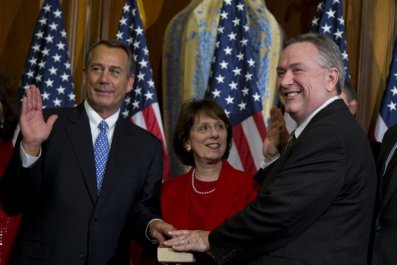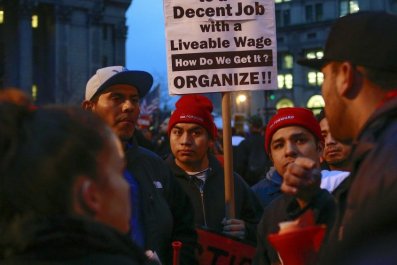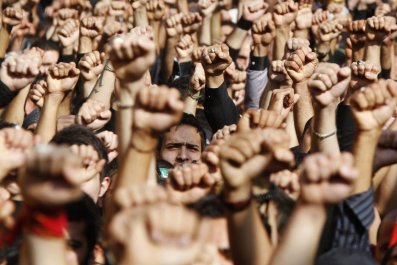If you are mentally troubled, don't count on professional medical help to nurse you back to health. It is getting increasingly hard to get treated, even if you have insurance.
Almost a year after the Newtown Massacre, which prompted calls for increased access to mental health care, new research indicates it's far more difficult to get psychiatric help in the U.S. than several years ago - and it's likely to get even worse.
Nearly half of private shrinks don't accept health insurance, which is shocking in the face of the mass shootings caused by disturbed Americans running amok with loaded weapons.
And while people are living longer, meaning dementia and other mental illness is on the rise, nearly half of private psychiatrists don't take Medicare either. For Medicaid patients, the take-up rate by psychiatrists is even worse.
Here are the hard facts: The number of private-sector psychiatrists who accept private insurance declined by 17 percent between 2005 and 2010 (the latest year for which data are available), to 55.3 percent. And psychiatrists who take Medicare fell 19 percent to 54.8 percent in the same period.
Medicaid acceptance rates stagnated around 43.1 percent, according to a JAMA (Journal of the American Medical Association) Psychiatry paper released Wednesday.
Private insurance, however, was accepted by some 88.7 percent of all other medical specialists in 2010. Other nonpsychiatrist physicians' 2010 Medicare and Medicaid acceptance rates were 86.1 and 73 percent, respectively.
Meanwhile, the labor force is shrinking. The number of psychiatrists dropped 14 percent from 2000 to 2008, according to study author Dr. Tara F. Bishop, an assistant professor of public health and medicine at Weill Cornell Medical College. This is poised to continue or worsen, as fewer medical students are picking psychiatry as a specialty - meaning the many expected to retire soon will not be replaced. (Fifty-five percent are 55 or older, the paper notes.)
"I was completely blown away by these numbers," Bishop tells Newsweek. "We had heard these stories from patients over and over again, but we never had numbers that really proved this is the case."
If access is difficult, patients who cannot get care early in the onset of mental illness might only receive help when it has reached a crisis - such as a suicide attempt or acute psychosis.
"We're putting people in unsafe situations," Bishop warns. "They may have no options and have to go to the emergency room. It's a pressing public health issue for our country."
It's a money issue, too.
Physicians often don't accept insurance because of low reimbursement, according to the paper. This hits psychiatry particularly hard, because the care requires more time than other specialties - so low reimbursement rates can't be made up with volume.
The ranks of psychiatric providers who accept insurance aren't all that reliable either - be they in the private or public sector, according to Dr. J. Wesley Boyd, attending psychiatrist at Cambridge Health Alliance and faculty member of Harvard Medical School.
Three years ago, Boyd and his colleagues posed as prospective outpatient psychiatric patients with insurance, who had been recently discharged from an ER for depression and seeking continuing care. As part of their survey, they called the 64 providers listed in the Blue Cross Blue Shield PPO database - i.e. providers that were supposed to accept their insurance - within a 10-mile radius of physician-saturated downtown Boston. Boyd picked that particular plan because it was among the best to see their success rate in an optimal situation.
Turns out, these experimental patients could only get appointments at eight of the 64 providers - and four of them would have to wait at least two weeks. Twenty-three percent of the time, Boyd and his colleagues did not receive a call back even after leaving two messages. Another 23 percent of the time, they were refused treatment if their primary care provider was not "in network." And 12 percent of the time, they were told outright that no psychiatrists were available.
Though the Mental Health Parity and Addiction Equity Act of 2008 (finalized this fall) basically requires that group health plans and insurers pay the same for mental health care as they would medical and surgical benefits, Boyd says that the legislative safeguard just does not work. Psychiatric patients still get the runaround from insurers, with physicians even fighting with companies to pay for a crucial visit to the ER.
"I would love to see parity made a reality," he tells Newsweek, with an air of skepticism in his voice, but "parity [also] is not going to do anything to change the fact that a lot of private practices are full."
The federal government is trying to address shortfalls in mental health, with Vice President Joe Biden recently promising $100 million to community health centers - with $50 million promised to rural regions. And the number of behavioral health workers in the National Health Services Corps, which deploys medical professionals to underserved areas, increased to 2,440 in 2013, up from 657 in those areas 10 years ago.
But public sector mental health care simply isn't equipped to deal with private shortfalls, nor will increased cooperation between psychiatrists and other mental health professionals - such as nurses and psychologists, advocates say.
"It's not a good situation," explains Andrew Sperling, director of legislative affairs at the National Alliance on Mental illness, a patient advocacy group. "It's going to take us a long time to get out of it."

























